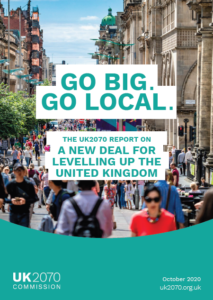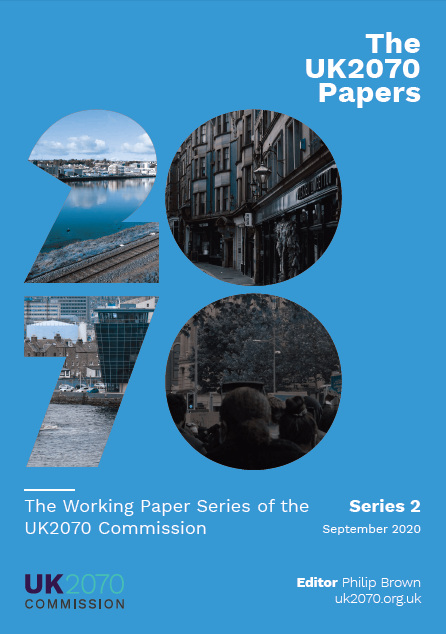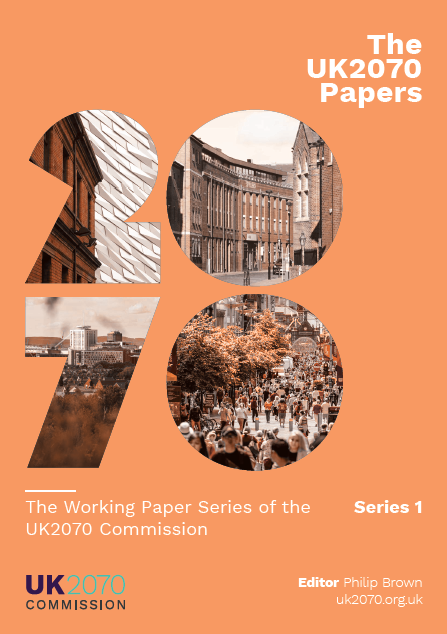- Lord Kerslake calls for ‘levelling up’ role to be given to a Cabinet Minister
- Fourth Industrial Revolution in the North of England could unlock thousands of skilled, future-ready jobs in green sectors and industries key to increasing productivity
The Northern Powerhouse Partnership (NPP) and the UK2070 Commission are together calling for Metro Mayors to be given a greater say in leading the UK’s recovery from COVID-19, including of the Fourth Industrial Revolution in the North of England.
Ahead of the 2020 Spending Review on Wednesday 25th November, NPP director Henri Murison and Chair of the UK2070 Commission The Right Honourable The Lord Kerslake, will each call for clarity on the plan for levelling up, alongside targeted investment in industries that increase productivity.
They will tell the House of Commons’ Business, Energy and Industrial Strategy Committee on Tuesday 24 November (10.30am start) that the UK’s recovery must focus on devolving more powers to locally-elected leaders and allowing them to upskill the workforce in key industries of the future, including advanced manufacturing, digital and green energies.
These sectors could hold the key to solving the UK’s productivity crisis that lies at the root of both the North-South divide, and wider regional inequalities across England.
While the Prime Minster has maintained that levelling up remains a top priority, Lord Kerslake will say that there is still no sign of a plan and that the government must appoint a dedicated Cabinet member and committee to ensure they deliver on election promises.
In October, the UK2070 Commission found that COVID-19 has exacerbated the UK’s economic dependency on London and the wider South East of England, calling for a £375bn 25-year New Deal strategy for a ‘just recovery’ to offset:
- The £4bn a year gap in research and development investment, through creating at least four global centres of science and technology outside the UK’s so called ‘Golden Triangle’.
- The £20bn per year cost of poor local connectivity, through major investment in transit systems in all major towns – and about 1,000 miles of new, upgraded and electrified main railway lines and services to more remote communities.
Last month, the UK2070 Commission set up the UK2070 Teesside Taskforce to support the creation of better-quality, skilled job opportunities in the North East of England, through investment in freeports, steel, hydrogen and the wider net-zero agenda.
Mr Murison will be speaking at The University of Sheffield’s Advanced Manufacturing Research Centre (AMRC), a world-leading research and innovation institution with more than 120 industrial partners.
The AMRC is part of The University of Sheffield and it is also one of the national High Value Manufacturing Catapult centres – a world-leading hub for manufacturing companies, academia and government to drive improvements across multiple industries; whether aerospace, energy, construction or rail.
The AMRC Training Centre in Rotherham provides apprenticeship training to students aged 16 and over through partnerships with both SMEs and global brands, including Boeing, Rolls-Royce and McLaren.
Mr Murison will highlight the role that companies like Sheffield Forgemasters can play in developing world-leading Small Modular Reactor technologies (SMR), with the potential to form a vital role in decarbonising the UK’s energy strategy and closing the power deficit.
In its recent Ten Point Plan for a Green Industrial Revolution, the UK Government announced £215 million funding for the UK SMR Consortium led by Rolls-Royce. The consortium comprises nine companies and research organisations, including the Nuclear AMRC – the AMRC’s sister centre, also part of the University of Sheffield – and the High Value Manufacturing Catapult.
The consortium aims to have its first power station in operation in the early 2030s, with the development programme creating around 6,000 jobs by 2025. By value up to 80 per cent of the power station’s components will be made in factories in the North of England and the Midlands.
Sheffield Forgemasters received funding from the government in 2019 to build a large-scale Bost five-axis Vertical Turning Lathe and a Bost RAM Boring Machine, the first of their kind in the UK, which combined with the company’s depth of manufacturing skill for civil nuclear projects, delivers a significant technological advantage in this market.
SMRs are potentially faster to manufacture, safer and easier to decommission than large nuclear power plants and, by keeping the supply chain in the UK, will create more skilled green jobs in the economic recovery.
Lord Kerslake said: “While we’ve seen plenty of warm words about levelling up, we still need a plan for devolution of further fiscal powers.”
“Central and regional government both have a part to play in delivering this agenda. We need a dedicated cabinet member and committee, working alongside Metro Mayors across the Western Gateway, the Midlands Engine and the Northern Powerhouse, to build a comprehensive plan for economic rebalancing.”
“The UK is one of the most centralised, imbalanced, developed countries in the world and this has a serious detrimental impact on our ability to drive economic growth. Recovery post COVID-19 will only take place once we realise that.”
Henri Murison said: “Unlocking the North of England’s true economic potential through accelerating decarbonisation and the Fourth Industrial Revolution is not only crucial to closing the North-South divide, it is essential to recovery across the whole of the UK.”
“The North’s vast economic assets are still hugely underutilised but through sustained investment in sectors such as off-shore wind, hydrogen and SMRs; alongside targeted, locally-led skills programmes; we can build back better in some of the areas worst-hit economically by COVID-19.”
“We need to invest in both infrastructure and people to deliver this vision, upskilling and reskilling the workforce in highly-productive industries and sustainable energies that drive economic growth across the whole of the country.”





 The Right Honourable The Lord Kerslake
The Right Honourable The Lord Kerslake

